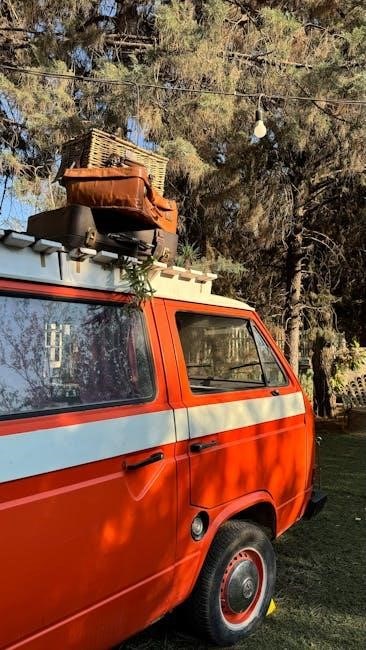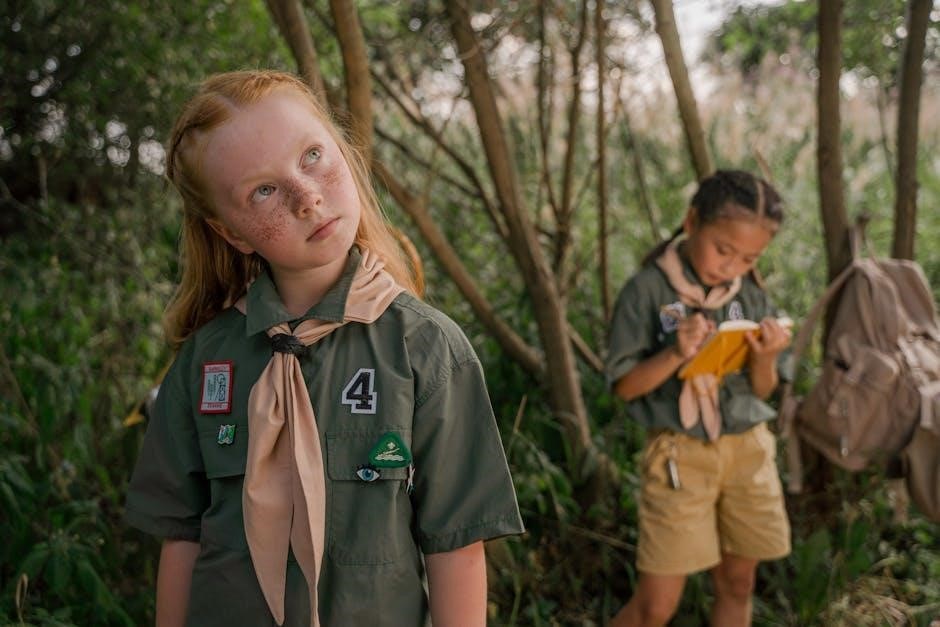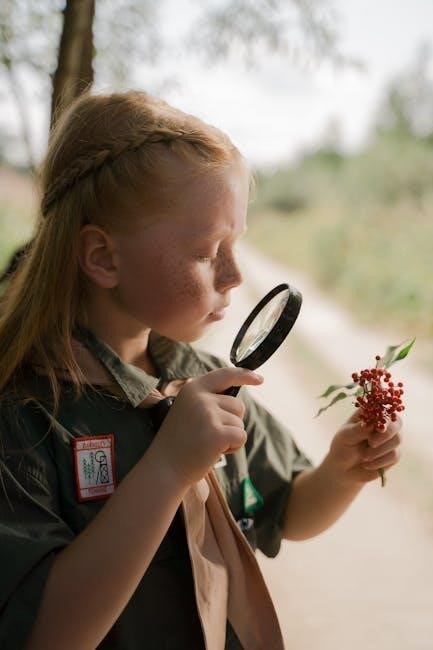camping merit badge requirements pdf

The Camping Merit Badge is an essential award for Scouts, focusing on outdoor skills, leadership, and conservation. Scouts learn through hands-on experiences, making it a popular merit badge among members.
1.1 Overview of the Camping Merit Badge
The Camping Merit Badge focuses on developing outdoor skills, leadership, and environmental stewardship. It requires Scouts to camp a total of 20 nights, including a long-term experience, and demonstrate proficiency in tent setup, campfire building, and meal preparation. The badge emphasizes patrol organization, duty rosters, and outdoor ethics, fostering teamwork and responsibility. It is a cornerstone of Scouting, promoting self-reliance and a deep connection with nature.
1.2 Importance of Camping in Scouting
Camping is a cornerstone of Scouting, fostering teamwork, leadership, and outdoor skills. It helps Scouts connect with nature, develop self-reliance, and build character. The Camping Merit Badge emphasizes these values, preparing Scouts for lifelong adventures and environmental stewardship. By mastering camping skills, Scouts gain confidence and a deeper appreciation for the outdoors, aligning with Scouting’s mission to prepare young people for life’s challenges.
1.3 Requirements for Earning the Badge
Earning the Camping Merit Badge requires Scouts to camp a total of 20 nights, including one long-term experience of up to six consecutive nights. They must also plan meals, organize patrols, and demonstrate outdoor skills. Scouts must show mastery of camping techniques, safety practices, and environmental ethics. These requirements ensure Scouts gain comprehensive camping knowledge and practical experience, preparing them for future adventures and leadership roles in outdoor settings.
Camping Merit Badge Requirements
The Camping Merit Badge requires Scouts to camp 20 nights, plan meals, organize patrols, and demonstrate outdoor skills, ensuring they gain essential camping knowledge and practical experience.
2.1 General Requirements
To earn the Camping Merit Badge, Scouts must camp a total of 20 nights at designated Scouting events, including one long-term experience of up to six consecutive nights. They must also demonstrate proficiency in outdoor skills, such as setting up camp, cooking, and navigating. Additionally, Scouts are expected to exhibit Scout spirit and adhere to the Scout Oath and Law throughout their camping experiences. This ensures a well-rounded understanding of camping principles and practices.
2.2 Specific Camping Experiences Required
Scouts must complete a long-term camping experience of up to six consecutive nights, which helps build resilience and teamwork. This requirement is crucial for understanding extended outdoor living. Additionally, Scouts must camp a total of 20 nights, with the remaining 14 nights coming from other Scouting activities. These experiences ensure a well-rounded understanding of camping skills and prepare Scouts for various outdoor challenges.
2.3 Outdoor Ethics and Scout Spirit
Scouts must demonstrate Scout spirit by living the Scout Oath and Law during camping activities. This includes practicing Leave No Trace principles to minimize environmental impact. Scouts are also expected to promote teamwork, respect, and adherence to outdoor ethics. Understanding and applying these principles ensures responsible camping practices and fosters a deeper connection with nature and Scouting values.

Detailed Requirements for the Camping Merit Badge
Scouts must camp a total of 20 nights, including one long-term experience of up to six consecutive nights. They must also organize a patrol, create a duty roster, and prepare meals, demonstrating mastery of camping skills and teamwork.
3.1 Camping a Total of 20 Nights
Scouts must camp a total of at least 20 nights at designated Scouting activities or events. This includes one long-term camping experience of up to six consecutive nights. These experiences help Scouts develop outdoor skills, teamwork, and self-reliance. The requirement ensures Scouts gain extensive hands-on experience in camping, preparing them for more advanced outdoor challenges and fostering a deeper connection with nature and their fellow Scouts.
3.2 Long-Term Camping Experience
The long-term camping experience requires Scouts to camp for up to six consecutive nights. This extended period helps build endurance, teamwork, and outdoor proficiency. Scouts learn to manage campsite logistics, prepare meals, and maintain a clean environment. This experience is crucial for developing leadership skills and fostering camaraderie within the patrol. It prepares Scouts for more challenging outdoor adventures and reinforces the importance of Scout spirit in sustained camping activities.
3.3 Patrol Organization and Duty Roster
Scouts must create a duty roster for their patrol, outlining roles and responsibilities during campouts. This demonstrates organization and accountability. Each member’s assignment ensures tasks are shared fairly, fostering teamwork and leadership. Scouts learn to delegate and manage duties effectively, promoting unity and cooperation within the group. This process highlights the importance of clear communication and mutual respect in achieving camping goals and maintaining a well-run campsite.
3.4 Meal Planning and Preparation
Scouts must plan and prepare meals for their patrol during campouts. This includes creating balanced menus, shopping for ingredients, and cooking outdoors. Scouts learn essential skills like food safety, cooking techniques, and proper cleanup. Meal planning fosters teamwork and responsibility, as each member contributes to providing nourishment for the group. This requirement ensures Scouts develop practical culinary skills while enjoying the camping experience together.
Preparation and Planning for Camping
Proper preparation ensures a safe and enjoyable camping experience. Scouts must plan meals, pack essential gear, and understand weather conditions to be fully prepared for their adventures.
4.1 Choosing a Campsite
Choosing the right campsite is crucial for a safe and enjoyable camping experience. Scouts should consider factors like terrain, proximity to water sources, and environmental regulations. Opt for flat, dry ground to ensure comfortable tent setup. Avoid areas prone to flooding or near wildlife habitats to minimize risks. Always check local camping regulations and ensure the site can accommodate the size of your group. Proper campsite selection helps preserve natural environments and ensures a pleasant stay.
4.2 Packing Essential Gear
Packing the right gear is vital for a successful camping trip. Include essentials like a tent, sleeping bag, sturdy clothing, and footwear. Bring cooking equipment, utensils, and a first-aid kit. Don’t forget water, food, and a map. Check weather forecasts to prepare for specific conditions. Always ensure gear is durable and suitable for outdoor use. Organize items efficiently to avoid overpacking and ensure a comfortable camping experience while following Leave No Trace principles.
4.3 Understanding Weather Conditions
Understanding weather conditions is crucial for safe camping; Always check forecasts before heading out and monitor conditions during your stay. Recognize signs of changing weather, like darkening skies or increasing winds, which may indicate storms. Prepare for emergencies by knowing what to do in cases of extreme weather, such as thunderstorms or floods. Stay informed and plan activities accordingly to ensure safety and a enjoyable camping experience for everyone involved.

Safety and Emergency Preparedness
Safety and emergency preparedness are vital for a successful camping experience. Scouts must learn to identify risks, respond to emergencies, and use proper first aid techniques. Being prepared for unexpected situations ensures the well-being of all campers and fosters confidence in handling challenges.
5.1 First Aid for Camping
First aid for camping involves understanding basic medical care for injuries common in outdoor settings. Scouts learn to treat wounds, burns, and fractures, and how to respond to ailments like heatstroke or hypothermia. Proper use of a first aid kit, wound cleaning, and applying bandages are essential skills. Knowing CPR and basic life support techniques is also crucial for emergencies. This training ensures Scouts can provide immediate care until professional help arrives.
5.2 Emergency Procedures
Scouts must understand emergency procedures to ensure safety during camping. This includes knowing how to react in dangerous situations, such as natural disasters or accidents. Proper communication, like using whistles or radios, is vital. Scouts should also learn how to create an emergency plan, including evacuation routes and assembly points. Knowing when to cancel a campout due to unsafe conditions is equally important to protect the group. Preparedness ensures timely and effective responses to crises.
5.3 Navigation and Orienteering
Navigation and orienteering are critical skills for Scouts to master. Scouts learn to use maps, compasses, and GPS devices to locate destinations and return safely. Understanding landmarks, natural features, and trail markers is essential. Scouts practice these skills through exercises like identifying directions and plotting courses. Proper navigation ensures Scouts stay on track and avoid getting lost, building confidence in their ability to explore the outdoors effectively and safely.

Outdoor Skills and Techniques
Mastering outdoor skills like tent setup, campfire building, and tool usage is vital for Scouts. These techniques ensure safety and comfort while camping, fostering self-reliance and confidence.
6.1 Setting Up a Tent
Setting up a tent is a fundamental camping skill that requires attention to detail. Scouts learn to choose a suitable site, prepare the ground, and assemble the tent properly. Using stakes, poles, and ropes effectively ensures stability. Practicing tent setup enhances teamwork and safety, preparing Scouts for various camping conditions. Mastering this skill builds confidence and self-reliance, essential for outdoor adventures;
6.2 Building a Campfire
Building a campfire is a crucial outdoor skill that Scouts must master. It involves selecting the right materials, using proper techniques, and maintaining safety. Scouts learn to start a fire without matches, keep it controlled, and ensure it is fully extinguished. This skill is essential for cooking, warmth, and morale during camping trips, while also teaching environmental responsibility and adherence to safety guidelines.
6.4 Using Camping Tools and Equipment
Scouts must demonstrate proficiency in using camping tools and equipment safely and effectively. This includes proper use of axes, hatchets, shovels, and other gear. Emphasis is placed on selecting the right tool for the task, maintaining equipment, and following safety protocols. Scouts also learn to sharpen tools and store them securely, ensuring both personal safety and environmental protection while camping.
Leadership and Teamwork in Camping
Leadership and teamwork are vital in camping, fostering collaboration and problem-solving. Scouts learn to lead by example, communicate effectively, and support each other in achieving shared goals.
7.1 Leadership Roles in a Patrol
Leadership roles within a patrol are crucial for effective camping operations. Scouts learn to lead by example, delegate tasks, and ensure responsibilities are fulfilled. The patrol leader oversees the group, while others may serve as quartermaster or scribe. These roles promote accountability, teamwork, and decision-making skills, preparing Scouts for future leadership challenges both in and out of camping environments.

7.2 Promoting Teamwork
Promoting teamwork is vital for successful camping experiences. Scouts learn to collaborate on tasks like setting up camp, cooking meals, and completing projects. Teamwork fosters camaraderie, shared responsibility, and mutual support. By working together, Scouts develop communication skills, problem-solving abilities, and a sense of unity. This collective effort strengthens the patrol’s effectiveness and ensures everyone contributes to achieving common goals during outdoor adventures.
7.3 Conflict Resolution
Conflict resolution is crucial for maintaining harmony within a patrol. Scouts learn to address disagreements respectfully, ensuring issues are resolved fairly and promptly. By fostering open communication and understanding, Scouts can transform conflicts into opportunities for growth. Respecting differing opinions and working toward mutually beneficial solutions strengthens unity and reinforces the Scout Oath and Law, ensuring a positive camping experience for all members.
Environmental Ethics and Conservation
Environmental ethics guide Scouts in conservation efforts, ensuring they leave minimal impact and protect natural habitats during camping activities, promoting sustainable practices and wildlife protection.
8.1 Leave No Trace Principles
Leave No Trace principles emphasize minimizing outdoor impact by planning ahead, staying on trails, and disposing of waste properly. Scouts learn to respect nature, protect wildlife, and leave campsites undisturbed. These ethical practices ensure ecosystems remain preserved for future generations, promoting sustainable camping and environmental stewardship. Properly applying these principles is crucial for maintaining natural beauty and biodiversity during Scouting activities.
8.2 Proper Waste Management
Proper waste management is crucial for maintaining a clean and sustainable campsite. Scouts must separate food waste, recyclables, and non-recyclables, and dispose of them in designated areas. Proper disposal prevents environmental pollution and protects wildlife. Always pack out what you bring in, and use biodegradable soap for dishwashing. Scouts should also bury human waste at least 6 inches deep and 200 feet away from water sources. This ensures a clean camping environment for future generations.
8.3 Protecting Wildlife and Ecosystems
Protecting wildlife and ecosystems is vital for preserving nature. Scouts must avoid littering, respect wildlife habitats, and minimize disturbance to plants and animals. Keeping a safe distance from wildlife prevents stress and potential harm. Using eco-friendly products and avoiding the introduction of invasive species helps maintain the ecosystem’s balance. These practices ensure the preservation of natural habitats for future generations to enjoy and learn from. Proper stewardship promotes sustainable outdoor experiences.
Earning the Camping Merit Badge is a rewarding experience that fosters outdoor skills, teamwork, and environmental stewardship. Scouts gain essential knowledge about camping, safety, and conservation, preparing them for lifelong adventures. By completing the requirements, Scouts demonstrate dedication to Scouting values and a deep appreciation for nature. This badge serves as a cornerstone for future outdoor leadership and personal growth in Scouting and beyond.





